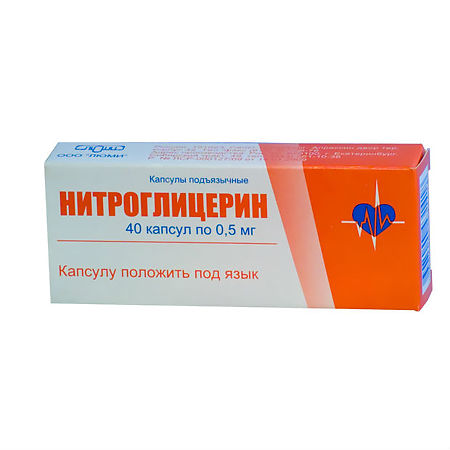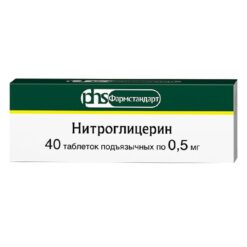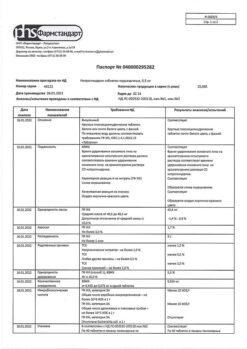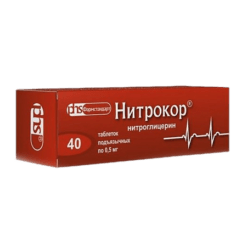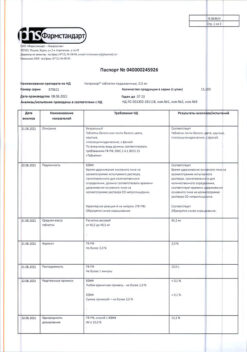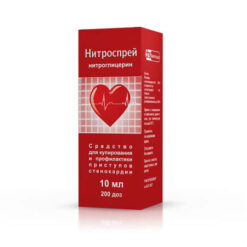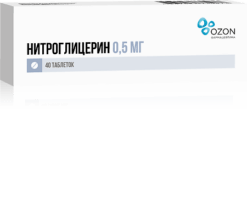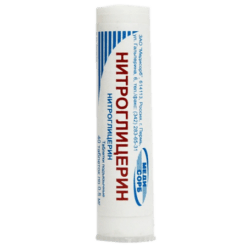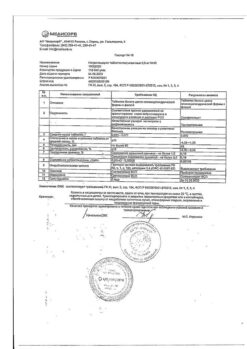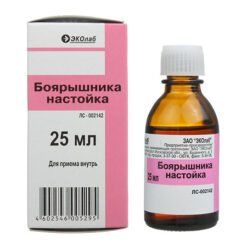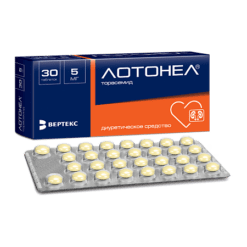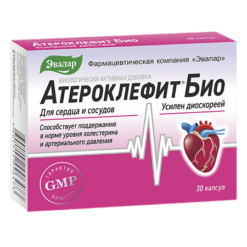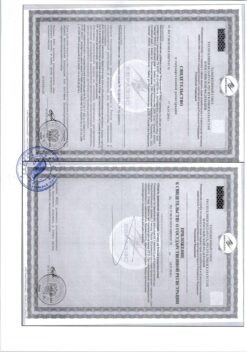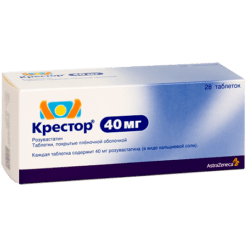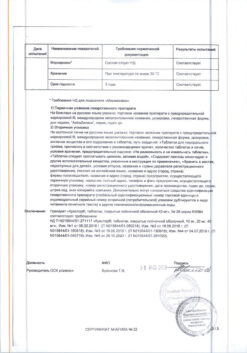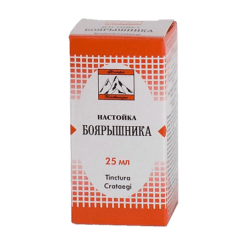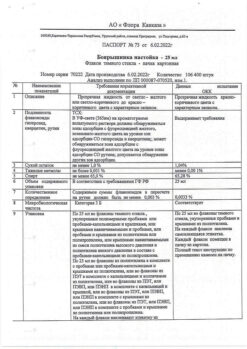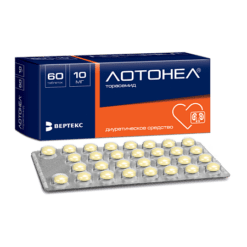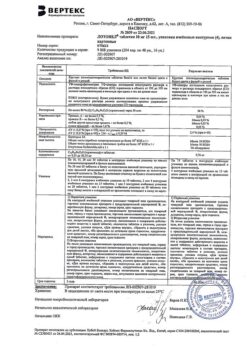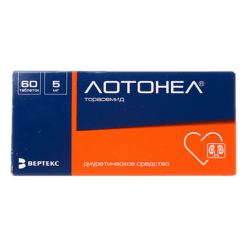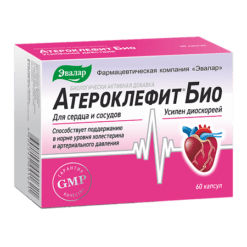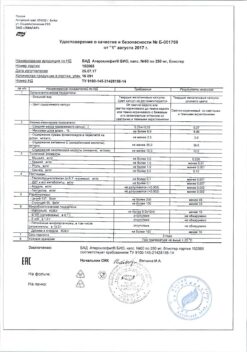No products in the cart.
Nitroglycerin, 0.5 mg capsules 40 pcs
€1.00
Out of stock
(E-mail when Stock is available)
Description
Nitroglycerin is a venodilator from the group of nitrates. Nitrates are able to release from their molecule nitric oxide, which is a natural endothelial relaxing factor – a mediator of direct guanylate cyclase activation. Increased concentration of cGMP leads to relaxation of smooth muscle fibers, mainly venules and veins. It has antianginal and antispasmodic effects, relaxes the smooth muscle of the vascular walls, bronchi, gastrointestinal tract, biliary tract, ureters. When administered intravenously (IV) it quickly reduces the preload on the heart due to the expansion of peripheral veins.
Decreases blood flow to the right atrium, promotes reduction of pressure in the small circle of circulation and regression of symptoms in pulmonary edema, reduces afterload, myocardial oxygen demand (by reducing the preload, afterload and ventricular wall tension due to decreased heart volume). It promotes redistribution of coronary blood flow in the area with reduced blood flow.
It has a central inhibitory effect on the sympathetic vascular tone, suppressing the vascular component of pain syndrome formation. Causes dilation of meningeal vessels, which explains the headache when using it.
Pharmacokinetics
In the systemic bloodstream, 60% is bound by plasma proteins. It is highly lipophilic and has a large volume of distribution (3.3-1.2 L/kg). It is rapidly metabolized in the liver by glutathione reductase, which affects organic nitrates, with the formation of di- and mononitrates; the final metabolite is glycerol. It is excreted by the kidneys as metabolites.
The total clearance is 30-78 l/min, half-life is 1-3 min. In addition, nitroglycerin is metabolized in erythrocytes by enzymatic reactions involving sulfhydryl radicals and by interaction with reduced hemoglobin.
Indications
Indications
Unstable angina, pulmonary edema, acute myocardial infarction (including complicated by acute left ventricular failure); relief of angina attacks.
Pharmacological effect
Pharmacological effect
Nitroglycerin is a venodilating agent from the nitrate group. Nitrates are capable of releasing nitric oxide from their molecule, which is a natural endothelial relaxing factor – a mediator of direct activation of guanylate cyclase. An increase in cGMP concentration leads to relaxation of smooth muscle fibers, mainly venules and veins. It has an antianginal and antispasmodic effect, relaxes the smooth muscles of the vascular walls, bronchi, gastrointestinal tract, biliary tract, and ureters. When administered intravenously (i.v.), it rapidly reduces preload on the heart due to dilation of peripheral veins.
Reduces blood flow to the right atrium, helps reduce pressure in the pulmonary circulation and regression of symptoms in pulmonary edema, reduces afterload, myocardial oxygen demand (by reducing preload, afterload and tension of the ventricular walls due to a decrease in heart volume). Promotes redistribution of coronary blood flow in areas with reduced blood circulation.
It has a central inhibitory effect on the sympathetic tone of blood vessels, inhibiting the vascular component of the formation of pain. Causes dilation of meningeal vessels, which explains headaches when using it.
Pharmacokinetics
Once in the systemic circulation, 60% is bound by blood plasma proteins. Highly lipophilic, has a large volume of distribution (3.3-1.2 l/kg). It is quickly metabolized in the liver by glutathione reductase, which acts on organic nitrates to form di- and mononitrates, the final metabolite is glycerol. Excreted by the kidneys in the form of metabolites.
The total clearance is 30-78 l/min, the half-life is 1-3 minutes. In addition, nitroglycerin is metabolized in erythrocytes using enzymatic reactions that occur with the participation of sulfhydryl radicals, as well as through interaction with reduced hemoglobin.
Special instructions
Special instructions
While taking nitroglycerin, there may be a significant decrease in blood pressure and the appearance of dizziness during a sudden transition to a vertical position from a “lying” or “sitting” position, when drinking alcohol, doing physical exercise, and in hot weather. Nitroglycerin, like all organic nitrates, develops addiction with frequent use and requires increasing the dose.
When driving vehicles and operating machinery that require increased attention, it should be borne in mind that taking nitroglycerin can lead to a decrease in the speed of motor and mental reactions.
The severity of headache while taking nitroglycerin can be reduced by reducing its dose and/or simultaneous administration of validol.
Active ingredient
Active ingredient
Nitroglycerine
Composition
Composition
Active ingredient:
nitroglycerin 0.5 mg;
Contraindications
Contraindications
severe anemia; hyperthyroidism; age under 18 years (safety of use has not been established); increased sensitivity to nitrates; cranial hypertension; cardiac tamponade; isolated mitral stenosis; constrictive pericarditis (conditions accompanied by a decrease in left ventricular filling pressure); uncontrolled hypovolemia; heart failure with normal or low pulmonary artery pressure; collapse; hemorrhagic stroke; subarachnoid hemorrhage; recent head injury; toxic pulmonary edema; idiopathic hypertrophic subaortic stenosis; angle-closure glaucoma with high intraocular pressure; cerebrovascular accident; shock; arterial hypotension (sBP; simultaneous use of sildenafil (Viagra); pregnancy; breastfeeding. With caution (comparing the risks and benefits): severe renal failure; liver failure (risk of developing methemoglobinemia).
Side Effects
Side Effects
Allergic reactions: rarely – skin rash, itching. Local reactions: skin hyperemia, skin itching, burning, allergic contact dermatitis.
From the cardiovascular system: dizziness, “nitrate” headache, tachycardia, skin flushing, fever, palpitations, decreased blood pressure, rarely (especially with overdose) – orthostatic collapse, cyanosis.
From the gastrointestinal tract: dry mouth, nausea, vomiting, abdominal pain.
From the central nervous system: rarely (especially in case of overdose) – anxiety, psychotic reactions, lethargy, disorientation.
Other: blurred vision, weakness, hypothermia, methemoglobinemia.
Interaction
Interaction
Prescription with dihydroergotamine may lead to an increase in its content in the blood and lead to an increase in blood pressure (increased bioavailability of dihydroergotamine).
The simultaneous administration of nitroglycerin and heparin reduces the effectiveness of the latter (after discontinuation of the drug, a significant decrease in blood clotting is possible, which may require a reduction in the dose of heparin).
Simultaneous administration with vasodilators, antihypertensive drugs, angiotensin-converting enzyme (ACE) inhibitors, beta-blockers, blockers of “slow” calcium channels, procainamide, tricyclic antidepressants, monoamine oxidase inhibitors (MAO), phosphodiesterase inhibitors, as well as ethanol, enhances the hypotensive effect.
Overdose
Overdose
Symptoms: reflex tachycardia, headache, asthenia may develop, a marked decrease in blood pressure (below 90 mm Hg) with orthostatic dysregulation, dizziness, increased drowsiness, feeling of heat, nausea, vomiting, when using high doses (more than 20 mg/kg) – collapse, cyanosis, methemoglobinemia, dyspnea and tachypnea.
Treatment: stop further administration. The head of the bed should be lowered and the patient’s legs should be raised.
As a rule, blood pressure normalizes within 15-20 minutes after stopping the administration of nitroglycerin, then administration can be continued after reselecting the infusion rate.
Storage conditions
Storage conditions
In a place protected from light and out of reach of children, away from fire, at a temperature of 5°C to 25°C.
Shelf life
Shelf life
3 years
Manufacturer
Manufacturer
Lyumi, Russia
Additional information
| Shelf life | 3 years |
|---|---|
| Conditions of storage | Keep out of the sight and reach of children, away from fire, at 5°C to 25°C. |
| Manufacturer | Lumi, Russia |
| Medication form | capsules |
| Brand | Lumi |
Other forms…
Related products
Buy Nitroglycerin, 0.5 mg capsules 40 pcs with delivery to USA, UK, Europe and over 120 other countries.

